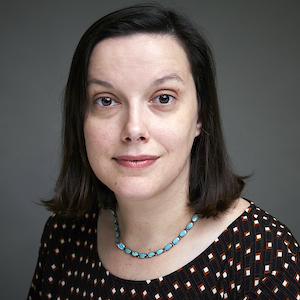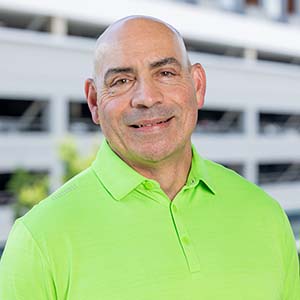Double Agent Profile: Ed Frank
Paying it forward
- Publish Date
- Authors
- Cathy Colliver
- Authors
- Ed Frank
Name: Ed Frank
Designation: Agent 00141
Double Agent Role: VP Customer Experience
Special Skills: Context switching—being able to deal with lots of different topics in a relatively short amount of time.
Aliases: ed-frank
Location: Castle Rock, CO
Favorite Emoji: 😉
What impact are you proudest of in your career?
There are quite a few, but generally seeing people I’ve worked with and coached go on to roles that fulfill them in some way. I am gratified when I see them achieving more than they thought they could and finding a great fit for themselves in a way that brings them satisfaction and joy. I’ve also been able to build authentic friendships with colleagues and clients that have lasted long after one of us has moved on to something else.
What has you most excited for your first year at Test Double?
Getting to know all the great agents and customers of Test Double and learning how I can help them and Test Double continue to grow.
What do you think makes Test Double unique?
It sounds trite, but it is true, our agents make us unique. Being able to field one or a team of agents that are not just great at delivering excellent software, but also are looking to make a positive impact on our clients’ business is truly unique in this space. Additionally, and as importantly, Test Double’s commitment to diversity, equity, and inclusion and our commitment to constant improvement are unique and critical defining features of our DNA.
What have you been thinking about a lot lately in software development and why?
Two things …
First, being in service to our customers by willing to engage with them in hard discussions about what is and isn’t working and giving them a perspective on how it could be better. So many companies are drowning in bad software and bad practices that they are too busy to see the root causes of their issues, let alone figure out how to fix them. That is where Test Double can add real value to our customers which makes us invaluable partners on their journey. That also means that we should feel like we have permission to ask questions, not only about the projects we are working on but also about what’s happening in other parts of the client’s business.
Second, strategic CIO’s/CTO’s are starting to think about resilient IT and I believe Test Double has a key role to play here. Not only do we help by building/rebuilding software that is less prone to failure, but we also help shine a light on our clients’ unsustainable (i.e., broken) development and product practices. We have also proven to be a reliable software consulting partner, delivering with excellence and with no disruption in our ability to support our customers. For the first time in a long time, I believe IT executives and other company leaders are becoming more sensitive to how world events can impact their ability to deliver and maintain software.
Your personal mission is also something we say a lot about helping our clients: we leave teams better than we found them. Why is this so important to you?
In 1986, at my commencement at Ohio State, Woody Hayes discussed ”Paying It Forward.” As a 22-year-old, I appreciated the concept but didn’t really get it until I was older. I realized later how much I had been informed and supported by those who touched my life in the past and present. I had no way to really pay them back, but I could pay it forward.
So my personal mission statement is, “to leave things better than I found them.” It is purposefully generic in that it encompasses individuals, teams, companies, systems, etc. It also doesn’t define an endpoint, as that would mean it’s perfect. Nor does it define how I do the work, so it could mean coaching, consulting, building something, teaching, or influencing people through a blog post or a presentation. That alignment with Test Double is why I am so excited to be here!
Tell me about something memorable that happened to you and what you learned from it.
It’s a very involved story, but I’ll leave out the details to get to the point. I was leading a project in Bogota, Columbia, and decided to deliver news to the CEO that his CFO was ineffective—to the point of causing real harm to the project and the company. Right before the meeting, I found out that the CEO and CFO had a personal “relationship” that was going to make my revelation even more awkward and possibly dangerous.
In the 90’s in Bogota, it was not unusual to be concerned about being kidnapped or worse, so the CEO’s office had thick bulletproof doors that were guarded by ex-special forces guards toting fully automatic rifles and wearing body armor. I had to walk by these armed guards while thinking about what I was about to say. I delivered the feedback as factually as I could and then left the next morning for home (with relief). When I returned two weeks later I found that the CEO had moved the former CFO to a less critical role in the company and found someone competent to replace her. In the end, it not only saved the project but also improved the operations of the company.
The lesson learned is that it often takes great courage to deliver challenging news to people, but if delivered factually and with the right intent, the results are more likely than not to be overwhelmingly positive. There is, in many respects, a positive correlation between the degree of difficulty of the news to deliver and the size of the benefit to the person you are delivering it to.
What has you most excited about this year outside of work?
We are just arriving at our first year in Colorado and as you can imagine last summer was a bit of a whirlwind getting moved in and acclimated to our new digs, so this summer my wife and I really want to take advantage of being here and spend time in places we’ve wanted to visit, like Steamboat Springs, Ouray, Gunnison, etc. In addition, to exploring the places in Denver, like the Botanical Gardens, the Denver Mint, Meow Wolf, and dozens of other places.
What book/podcast/movie/TV show have you been thinking about a lot lately, and why?
The Benjamin Franklin documentary by Ken Burns
Benjamin Franklin and John Adams are my two favorite founding fathers, both principled, but flawed characters. No two people could be further apart in their moral and ethical approaches, with Adams being the prototypical hardworking and dogmatic New Englander and Franklin being a self-made pragmatic global icon.
In particular, Benjamin Franklin epitomized the age of enlightenment as a publisher, civil servant, and inventor. He had an entrepreneur’s mind and a philosopher’s soul. His gift for communication and politics enabled him to galvanize the people and his colleagues in the Continental Congress around his ideals, as well as convince France to enter the Revolutionary War on the side of the upstart Americans. He was curious until the day he died, which drove his lifelong love of learning. And he showed a capacity to grow and change from his studies—from trying to preserve America’s ties to the English Crown to being it’s most ardent supporter for independence, or from owning slaves to writing and publishing his support for the abolition of slavery.
I admire his ability to recognize his own faults, desire to always improve, ability to communicate, pragmatic approach to everything (very results-oriented), ability to dream, and shrewdness. I also am fascinated by his ability to turn almost nothing into something great, his understanding of when to take the lead and a backseat, and his capacity to call out his own mistakes and try to correct them.
What is the biggest lesson the pandemic taught you?
We can overcome most impediments and even thrive in the face of challenges with one exception and that is the need for in-person human connections. We need real-life relationships to maintain our sanity and balance. I did not realize how much I value my relationships with my family and friends until I was deprived of them.
What’s something interesting about you that’s not on your resume or LinkedIn?
When I had my own consulting firm, I contracted out to a career transition firm where I specialized in helping executives who had just been let go find their next career and occasionally got drafted to help talk with people who were getting laid off en masse.
The experience, though challenging, was rewarding as most of the folks I worked with went on to more fulfilling careers. It taught me a great deal about empathy, how important the right job is to one’s well-being, how much self-doubt even the most confident executives have, and how rewarding it was to help people through some of their most difficult times. It also helped me to understand how much I valued coaching and mentoring people, and how I wanted to be part of an organization that valued humans.
This interview is based on a recorded conversation with Ed Frank and Cathy Colliver. It may or may not self-destruct.
Cathy Colliver
- Status
- Double Agent
- Code Name
- Agent 0080
- Location
- Louisville, KY
Ed Frank
- Status
- Double Agent
- Code Name
- Agent 00141
- Location
- Castle Rock, CO

